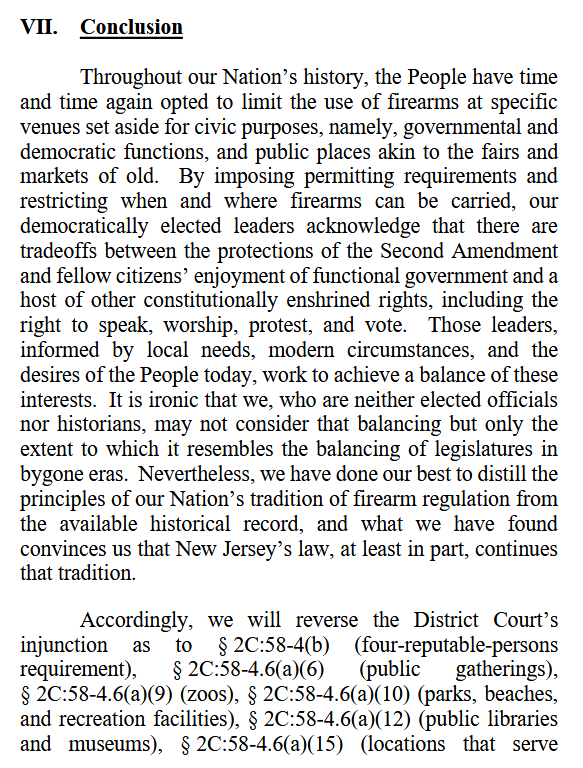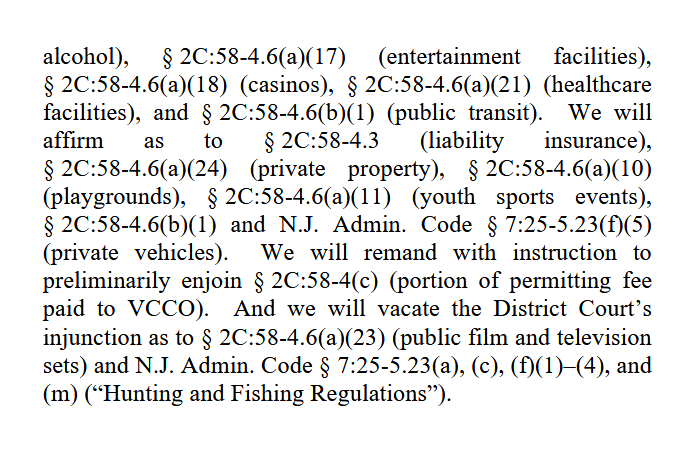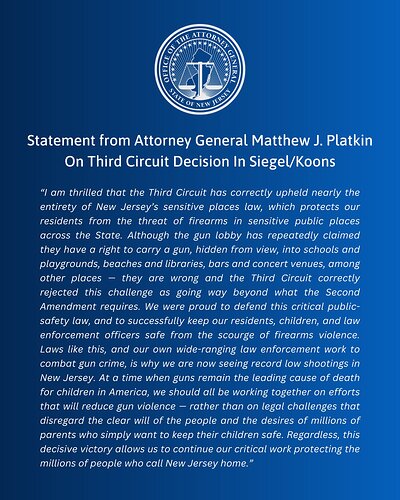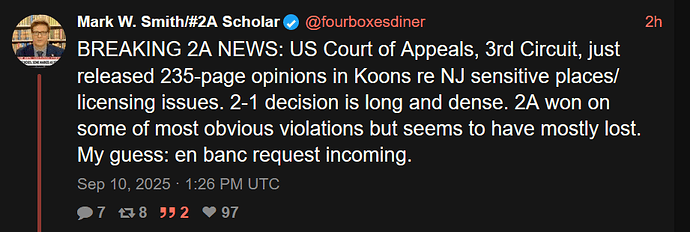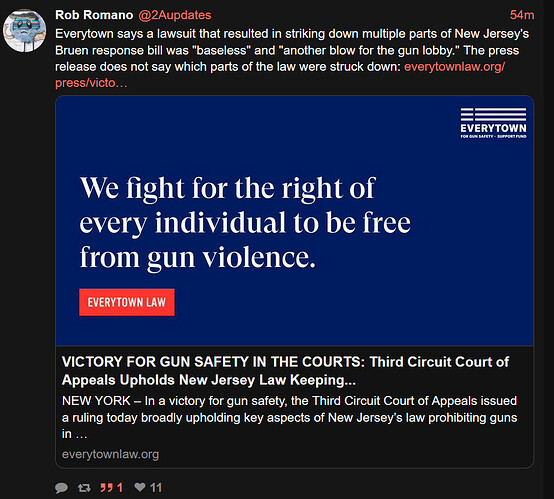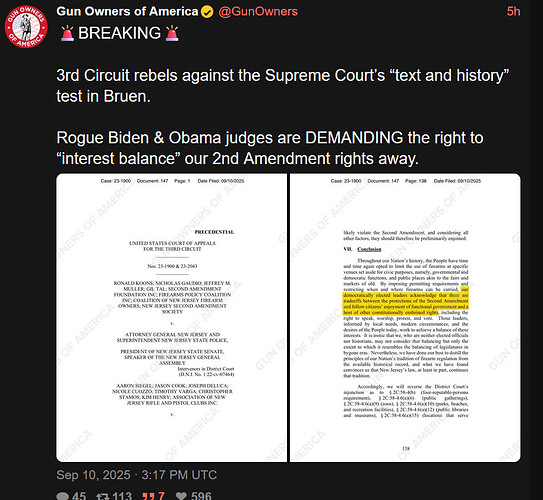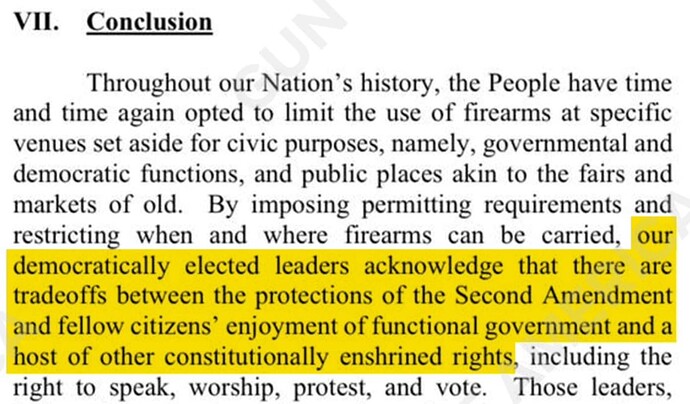FINALLLLLLLLLLLLLLLLLLLLY! (more details shortly)
NJFOS President Mark Cheeseman:
As President of NJFOS I personally do not consider today’s decision from the third circuit a win. If anything this decision shows what happens when the arguments are not strong enough. We essentially are still left with the same unconstitutional laws from a legislature acting as two government entities, and a weak judiciary filled with uneducated and incompetent judges.
We need to do much better going forward. Rushing cases and providing weak arguments is not going to restore our rights.
NJFOS:
NJFOS’ Preliminary Analysis on the Koons Siegel Opinion
Essentially, most things stay the same. Everything the 3rd circuit put a stay on from the district court they kept in place by reversing the district. In addition, we lost Film Sets. It also appears carry ON public transportation is now out entirely, not just at hubs.
That means Public property, private property held open to public, and vehicle carry all remain legal for us.
All areas previously blocked, parks, playgrounds, beaches, places serving alcohol for consumption, medical facilities, daycares, youth sporting events, permitted gatherings, casinos, and now film sets are off limits as “sensitive locations”, as well as all public transportation.
The only win, the 3rd circuit agrees with plaintiffs that the $50 fee paid to the state for the Victims of Crime Compensation fund is unconstitutional and thus reduces the fee from $200 (split 150/50 township to state) to $150 only to the processing authority.
Both plaintiffs and defendants have opportunity to appeal either en banc or to SCOTUS (though SCOTUS has shown they will NOT take interlocutory appeals so this is highly unlikely). If appeals are not made the case will then be remanded back to Judge Bumb in district court to resume the case and go to final judgement.
The Court’s Judgement as written is below:
Accordingly, we will reverse the District Court’s injunction as to § 2C:58-4(b) (four-reputable-persons requirement), § 2C:58-4.6(a)(6) (public gatherings), § 2C:58-4.6(a)(9) (zoos), § 2C:58-4.6(a)(10) (parks, beaches, and recreation facilities), § 2C:58-4.6(a)(12) (public libraries and museums), § 2C:58-4.6(a)(15) (locations that serve alcohol), § 2C:58-4.6(a)(17) (entertainment facilities), § 2C:58-4.6(a)(18) (casinos), § 2C:58-4.6(a)(21) (healthcare facilities), and § 2C:58-4.6(b)(1) (public transit). We will affirm as to § 2C:58-4.3 (liability insurance), § 2C:58-4.6(a)(24) (private property), § 2C:58-4.6(a)(10) (playgrounds), § 2C:58-4.6(a)(11) (youth sports events), § 2C:58-4.6(b)(1) and N.J. Admin. Code § 7:25-5.23(f)(5) (private vehicles). We will remand with instruction to preliminarily enjoin § 2C:58-4(c) (portion of permitting fee paid to VCCO). And we will vacate the District Court’s injunction as to § 2C:58-4.6(a)(23) (public film and television sets) and N.J. Admin. Code § 7:25-5.23(a), (c), (f)(1)–(4), and (m) (“Hunting and Fishing Regulations”).
Additional analysis is ongoing and we will alert everyone when we have more.
BOHICA!
They stated "In the absence of a “comprehensive[] defin[ition]” from the Supreme Court of what constitutes “sensitive places” where the government may restrict the right to bear arms, where the government may restrict the right to bear arms, Bruen, 597 U.S. at 30, this case requires us to navigate the “unchartered frontiers,”
Second Amendment Foundation (SAF):
BREAKING: This morning the Third Circuit Court of Appeals released its Opinion in Koons v. Platkin, SAF’s challenge to New Jersey’s so-called “Sensitive Places Ban” passed post-Bruen to make carry permits in the state practically useless.
The challenged law created a series of categories of “sensitive places” in which even permitted concealed carriers were prohibited from carrying their firearms.
In today’s opinion, the Third Circuit upheld the preliminary injunction SAF had won at the district court on some of those categories, namely; playgrounds, youth sports events, private vehicles, public property, and private property without the owners express consent. It also upheld the injunctions against New Jersey’s $50 tax on public carry and the $300,000 liability insurance mandate.
The decision however, upholds the carry prohibitions on a significant number of location categories including; public gatherings, zoos, parks, beaches and recreation facilities, public libraries and museums, locations that serve alcohol, entertainment facilities, casinos, healthcare facilities, and public transit, as well as the “four reputable persons” character reference requirement to apply for a permit.
Its important to remember that this is still a preliminary decision and the case remains active and ongoing. You can read the entirety of the opinion at SAF.org and stay up to date on further developments in this case here and anywhere else you get your SAF news.
We allowed to use adult language here?
Flipping bull feces. Not really surprised though.
The ban on public transportation is absurd. That is one of the places where it is needest the most. What about those who rely on public transportation? If they have to take public transportation to a place where they can, and should be carrying, now they can’t. Makes no sense at all, none of this makes any sense, but that’s The people’s republic of NJ for you
NJFOS Mark Cheeseman:
In short, the timeline looks like this:
1. Lawsuit filed, parties make their initial arguments This is unconstitutional for XYZ reasons.”, State: “This is fine for ABC reasons.”)
2. Judge does a quick look at the initial arguments and issues a preliminary injunction (is the law entirely put on hold, partially put on hold, or allowed to remain in effect while additional, more detailed arguments and hearings take place). This isn’t a final ruling and the PI isn’t based on an argument of the full merits of the case, just the initial ones.
3. If the parties disagree with the PI, they can appeal it. That occurred in this case, and the appeals court says some parts of the law are on hold as the legal action works its way through the courts, while other parts are allowed to take effect.
4. This decision can be further appealed to higher levels (to the en banc court, the Supreme Court, etc., but these appeals aren’t always accepted by the courts and they often let the appeals court ruling stand).
5. The parties go back to the lower court and make more detailed, substantive arguments regarding the merits of the claims.
6. The lower court issues a decision. This decision can be appealed.
7. The parties make their arguments about how the lower court erred (or was correct) to the appeals court.
8. The appeals court issues its decision.
9. The parties can appeal to the en banc court or Supreme Court. They’re slightly more likely to accept appeals of final decisions made on the merits, rather than preliminary injunctions.
10. If accepted by the higher courts, the appeals continue until all appeals (or the parties money) are exhausted or both parties decide to not appeal and accept the ruling.
This case is at #3. It can go to #4 if the decide to appeal it further, or they can accept the appeals court decision about the PI and skip #4 and go right to #5.
I certainly hope they are going for enbanc, the court makeup should be different by then
What kind of indication is this for Oct 15th
Awb and mag restriction
Very different. AWB/Mag restriction case is now En Banc 3rd circuit instead of this 3 judge panel (which was 2 out of 3 Obama/Biden appointed, Krause & Chung).
AWB/Mag restriction En Banc panel is something like 8 vs. 6 conservative vs. liberal justices.
FPC:
We are reviewing this preliminary injunction-stage decision with our objective unchanged: to end New Jersey’s immoral and unconstitutional carry bans. While today’s ruling offers a partial but important recognition of our position and acknowledges serious defects in the State’s laws, it does not go nearly far enough. FPC remains committed to proving—when this case moves to final judgment—that these restrictions are an assault on peaceable people and must be struck down permanently.
This quote form the dissent captures the essence of the majority’s mindbending lack of logic.
And when the majority compares modern laws to earlier laws, its definition of relevance is highly elastic. For example, the majority approves New Jersey’s firearms prohibition on public transit by analogizing to post-Reconstruction laws banning shooting at or on trains. Maj. Op. 130 & n.179.8 By that logic, a modern law prohibiting carrying firearms on one’s person would be constitutional because it is broadly analogous to old laws against shooting one another.

